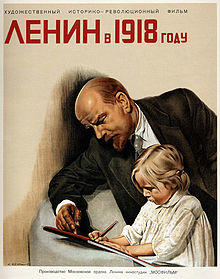| Lenin in 1918 (Ленин в 1918 году) | |
|---|---|
 Film poster | |
| Directed by | Mikhail Romm |
Production company | |
Release date |
|
Running time | 131 minutes |
| Country | Soviet Union |
| Language | Russian |
Lenin in 1918 (Russian: Ленин в 1918 году, Lenin v 1918 godu) is a 130-minute-long Soviet film released in 1939. It gives the background of the Russian Civil War after the October Revolution.[1]
The film was directed by Mikhail Romm with E. Aron and I. Simkov as co-directors. The script was written by Aleksei Kapler together with Taisiya Zlatogorova.
Cast (in credits order)
- Boris Shchukin as Vladimir Lenin
- Nikolai Okhlopkov as Vasili, Lenin's protégé
- Aleksandr Shatov as Konstantinov, conspirator chieftain
- V. Markov as Felix Edmundovich Dzerzhinsky
- Vasili Vanin as Kremlin Commandant Mateyev
- Nikolai Cherkasov as Maksim Gorky
- Leonid Lyubashevsky as Yakov Sverdlov
- Vladimir Solovyov as Sintsov, a spy
- Nikolai Svobodin as Rutkovsky, a conspirator
- V. Tretyakov as Novikov, a conspirator
- Natalie Efron as Fanny Kaplan
- E. Muzil as Yevdokia Ivanova, Lenin's housekeeper
- Mikheil Gelovani as Joseph Stalin (scenes deleted for reissues after Stalin's death and denunciation)
- Nikolai Bogolyubov as Kliment Voroshilov (scenes deleted for reissues after Stalin's death and denunciation)
- Z. Dobina as Nadezhda Konstantinovna Krupskaya
- S. Koziminsky as Bobilev, Lenin's orderly
- K. Korobova as Vasili's Wife
- Dmitri Orlov as Korobov, farm worker
- Nikolai Plotnikov as Kulak from Tamborsk
- Iosif Tolchanov as Andrei Fedorovich, attending physician
- A. Khokhlov as Professor of Medicine
Production
The shooting started on August 10, 1938 and lasted for eighty-seven days. Shchukin never saw Lenin in real life, but he did intense research, immsersing himself in everything related to him. During the production of Lenin in 1918, Boris Shchukin constantly suffered from ill health. Exactly six months after his appearance in the film and while a sequel was being developed Shchukin died.[1]
References
- ^ a b Jay Leyda (1960). Kino: A History of the Russian and Soviet Film. George Allen & Unwin. pp. 352–353.
External links
- Lenin in 1918 at IMDb